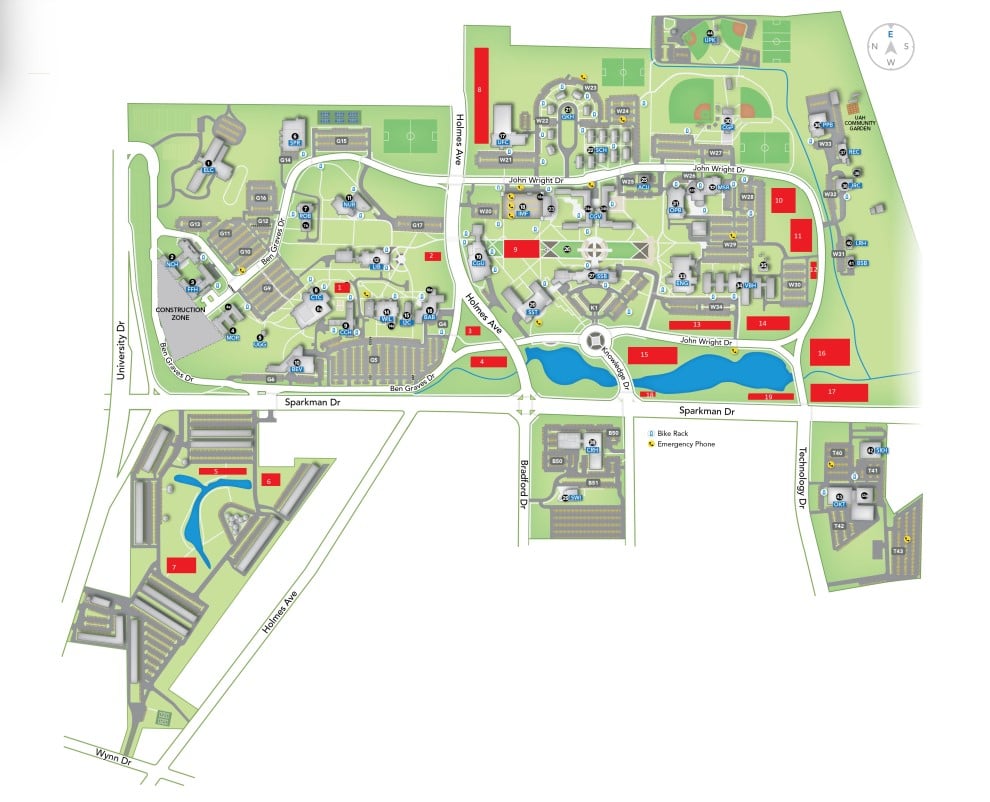ANDALUSIA, Ala. (CN) — Does a recently enacted law in Alabama give universities the authority to limit where and when political speech can occur on campus?
That was the question before the Alabama Supreme Court on Thursday as it convened on the campus of Lurleen B. Wallace Community College in Andalusia to hear oral arguments coinciding with Constitution Day – coincidentally, a question about the fundamental right to free speech.
A student group claims the University of Alabama in Huntsville’s 2020 policy for the use of outdoor areas of campus runs afoul of the 2019 Campus Free Speech Act by requiring students to obtain permission to speak at least three days in advance and by limiting the areas of campus where such speech may occur.
The state law provides that students may engage in “spontaneously and contemporaneously assemble, speak, and distribute literature,” but the school limits the content of such spontaneous speech to recent events, or simply for the distribution of literature without verbal speech.
The underlying complaint was filed in July 2021 on behalf of the Young Americans for Liberty at UAH and Joshua Greer, a UAH student and the organization’s chapter president. The plaintiffs sought to strike down UAH’s prior approval requirement, the spontaneous speech exception and related speech zones, while also enjoining the university from enforcing such restrictions.
A circuit court judge in Madison County dismissed the case prior to discovery in February 2022, setting the stage for Thursday’s appeal before Alabama's top court.
“[The Act] provides that the university ‘may maintain and enforce constitutional time, place, and manner restrictions’ as long as they ‘are narrowly tailored to serve a significant institutional interest and when the restrictions employ clear, published, content-neutral, and viewpoint-neutral criteria, and provide for ample alternative means of expression,’” Judge Alison S. Austin determined in February.
She added, “In other words, the legislature adopted a requirement that the university enact procedures to protect ‘the discovery, improvement, transmission, and dissemination of knowledge by means of research, teaching, discussion, and debate’ on campus, but also mandated that those time, place, and manner restrictions are narrowly tailored and content and viewpoint neutral.”
In dismissing the case, Austin indeed determined UAH’s policy was narrowly tailored and content and viewpoint neutral.
“The university’s policy does not prevent plaintiffs’ expression,” she wrote. “It merely regulates, in a viewpoint- and content-neutral manner, when and where plaintiffs may speak on the university’s property. Such time, place, and manner restrictions are permissible under Alabama’s Constitution.”
On Thursday, the students' attorney Mathew Hoffmann of the Alliance Defending Freedom argued the Campus Free Speech Act’s specific prohibition against “free speech zones” fit the UAH policy “like a glove.”
“The UAH policy is not narrowly tailored because it applies even to individuals,” Hoffmann said, adding its limitations on spontaneous speech to recent events “grants unbridled discretion” to school administrators, who may “pick and choose acceptable speech” under the policy. The state law, he argued, promotes free expression on public campuses “to the fullest extent possible.”
On the contrary, 13 of the 20 free speech zones on the UAH campus exclusively border parking lots, roads or water features, areas of the campus people are not likely to congregate to hear and share ideas.
Justice Jay Mitchell asked for an example of a compliant policy and Hoffmann said to look no further than the host campus for Thursday's hearing: Lurleen B. Wallace Community College allows spontaneous speech in all areas of the campus, so long as it does not interfere with public safety, educational instruction or physical movement.
The plaintiffs did not argue the policy was used against them, rather, they claim it prevents them from promoting “free speech as a fundamental constitutional right.” The harm, according to their brief, is the students have “refrained from speaking freely in the outdoor areas of campus because they credibly fear discipline for violating the policy … This self-censorship has prevented plaintiffs from recruiting as effectively for [Young Americans for Liberty.]”
In a separate argument, the students claimed the state law does not comply with the Alabama Constitution because it prevents the university’s board of trustees from meeting its obligation of “managing and controlling” the institution.
On behalf of the university, attorney Jay M. Ezelle told the court the UAH policy does comply with state law, and its intent is to preserve the institution’s primary mission of education and research. Free expression of speech, he acknowledged, has become “a big problem” in the country, where individuals are often “shouted down by the mob.”
According to the Campus Free Speech Act, although free speech zones are impermissible, “time, place and manner restrictions” are allowable. The areas UAH has identified as appropriate for speech cannot be defined as “free speech zones” because they were not created with the intent of limiting or prohibiting speech, Ezelle said. Notably, the UAH policy does allow speech in other areas of campus, but it still requires administrative permission.
“You have to allow free expression in outdoor areas and you have to allow spontaneous assembly,” Ezelle said. The UAH policy does both, he argued. Yet Ezelle did agree — although it is only a question if the case is remanded — that the state law may be unconstitutional.
“It’s unconstitutional because it removes management and control from the board of trustees,” he said.
Subscribe to Closing Arguments
Sign up for new weekly newsletter Closing Arguments to get the latest about ongoing trials, major litigation and hot cases and rulings in courthouses around the U.S. and the world.








